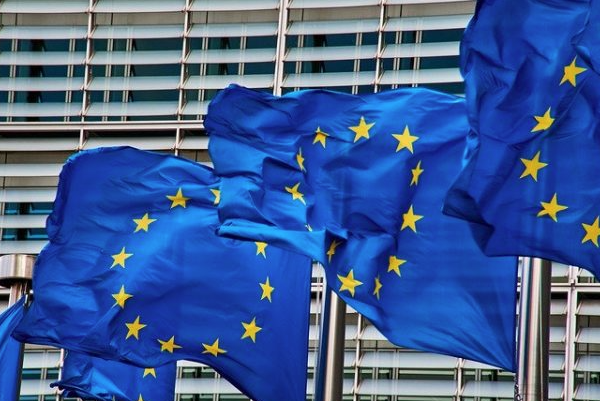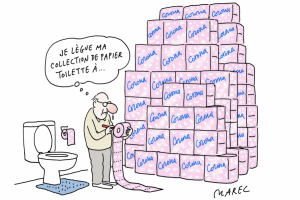
EU Covid-19 measures: Where does philanthropy fit in?
June 3, 2020
Eva Aldrich: Why every capital campaign needs a feasibility study
July 1, 2020With potential legators living at risk of the coronavirus, charities have questioned how they should broach the topic of gifts in Wills. Fundraising Europe explores what can be done to keep legacy giving front of mind during a pandemic.
Legacy giving has become increasingly popular with the charity supporters in recent years and is now one of the most important and treasured forms of voluntary income in Europe. Just last month, Give Sweden announced that legacy income in Sweden had increased by 80% in the past six years alone, with Finland to the UK also reporting longer-term growth in charitable Wills before the pandemic set in.
And yet, with potential legators now living in fear of the coronavirus, legacy fundraisers are questioning how they should continue to broach the topic of gifts in Wills at such a sensitive time.
Theo Hesen, co-founder of the GoedNalaten Institute, says:
“Legacy giving is a wonderful way to inspire people to benefit good causes long after they are gone. But in these days of Covid-19, many campaigns have been put on hold until it seems like the right time to approach conversations about gifts in Wills once more, without fear that it would be perceived negatively. At the same time, Will-writers have never been so busy. Charities too are reporting more legacy enquiries than ever.
“A lot of people are thinking about their life and about their legacy right now. The challenge is how best to sow the seed of legacy giving and inspire these people to leave a gift during such times.”
Ironically, at the very time that Will-writing enquiries are peaking across Europe, fundraisers have been uncertain whether it’s right to communicate their need for a legacy now. So, in a global pandemic where mortality is so prominent, what can charities do to keep gifts in Wills front of mind?
Be flexible and ready for change
During the many weeks in lockdown, people’s daily lives were dramatically altered. Charity fundraising and communication strategies had to evolve too. Some cancelled their legacy campaigns altogether, while others adjusted the messaging and the channels used, closely monitoring feedback from the public. Legacy experts highlight the need to be willing and ready to adapt.

Benjamin Zessner Spitzenberg, MSF Austria
“We had planned to promote legacies this Spring, but when the country went into lockdown, everything changed,” says Benjamin Zessner-Spitzenberg, philanthropy | gifts in wills at Doctors Without Borders (Médecins Sans Frontières) Austria.
“Events with notaries were the core of our programme and suddenly we had to re-think the number of people we would reach, how we would engage them, all of our KPIs, taking it online, promoting it on social media and by email.
“It went really well and generated lots of leads, but if there’s one thing I think we’ve learnt from the pandemic, it’s that we need to be ready to act faster. In the first two weeks of lockdown, before we began our proactive legacy campaign, MSF Austria had a 70% increase in legacy enquiries on the website and more phone calls. If we were ready to act sooner, I’m sure our results would have been even stronger.”

Rebecka Winell, Barncancerfonden
Rebecka Winell, head of major gifts and legacies at the Swedish Childhood Cancer Foundation (Barncancerfonden), says: “It’s important to plan ahead, but the coronavirus has reinforced how crucial it is to be flexible.
“Life isn’t rosy and there will be crises in the future. As legacy fundraisers, we have to be ready to act and to show supporters what they can do to help.”
Winell emphasises the importance of having support for legacies at all levels of the organisation, with a clear understanding of the key role of this income stream.
She adds: “It’s critical that our legacy programme is visible. We should embrace it, celebrate our legacy givers and have the courage to be a bit more inventive in our approach.”
Focus on supporter stewardship, softening the legacy ‘ask’
As Covid-19 escalated across Europe, so too did levels of public distress and grief. People have become so much more aware of their fragility. Supporters are living with concerns about their health and their loved ones, grieving for those they have lost while many continue to battle loneliness, spending weeks in isolation. And the threat of a second wave of the pandemic remains very real.
“Against this backdrop, empathy and sensitivity are paramount,” says legacy fundraising consultant Richard Radcliffe (Radcliffe Consulting).
“You never know where someone is in relation to their own health or the worries they might be going through. The coronavirus has made that even more evident; we’re all on the alert, anyone could be suffering and it makes it all the more important that we listen to supporters and take our lead from them.
“Charities absolutely need to be talking about legacies and promoting the opportunity of giving in this way, but that’s more subtle than asking people to write them into their Will here and now.”

Rob Cope, Remember A Charity
Rob Cope, director of Remember A Charity – the UK-based legacy promotion consortium said: “Fundraisers recognise that no matter how urgent their need for funding, this is an exceptional time. Most of the charities we spoke with drew back from making direct asks for gifts in Wills during the height of the pandemic, concentrating instead on looking after supporter relationships.
“Legacies will be critical in ensuring that charitable services can survive this crisis and any shortage of funds in the years ahead. So, deepening the focus on supporter care and using a range of channels and approaches to keep legacies front of mind is likely the best investment charities can make.”
Celebrate the impact of legacy givers
Fundraisers report that many of their supporters, particularly those who live alone, were keen to talk and to hear stories of the impact of legacy givers.
Zessner-Spitzenberg says: “Although we need to be sensitive about how we communicate legacies at a time like this, we find that people really love the idea of helping others and saving lives after they are gone and we do all we can to ensure that legacy pledgers recognise just how thankful we are.”
Winell adds: “We don’t specifically advertise legacy giving, but we do weave messaging about the importance of legacies throughout our communications, celebrating our legators. That’s what is most successful for us; sharing the story of pledgers and legators on social media, and in our newsletters.
“Non-profits can be so worried when it comes to communicating legacies, but people really do want to give in this way and to understand more about it.”
Meet the appetite for Will-writing knowledge
Many of the most successful legacy campaigns in recent months have focused on providing information about leaving gifts in Wills. Increasingly, charities and consortia offer partnerships with legal firms, notaries and Will-writers to help ensure that the public know where to go for impartial professional advice about the practicalities of doing so.
With the public eager to ensure that they leave their affairs in good order, offering Will-writing information through charity materials, websites and through such partnerships can be as beneficial for the public as it is for nonprofits.

Carine Coopman, testament.be
Carine Coopman, national coordinator of the Belgian legacy promotion campaign testament.be, says:
“Our consumer campaign took place this April, right in the middle of the corona crisis. Although we questioned whether the time was right for legacy promotion, we decided to go ahead with our activities; a high profile advertising campaign, the launch of guidebooks for potential legacy supporters, information sessions, a helpdesk, and more.
“The advertising campaign conveyed the overarching message that 5 people a day are leaving gifts in their Wills, normalising charitable Will-writing and thanking the public for their support, encouraging others to take action too.
“When we called supporters to ask for their feedback, we had a really positive response. Our key take-out from this is that, in corona times it’s all the more important that charities don’t disappear. We may need to change our approach and our messaging, but we certainly can’t afford to leave legacies in the dark.”
Embrace digital and the opportunity to innovate
While fundraisers haven’t been able to host events, meet potential legacy supporters and – in many cases – mail supporters, they have explored new ways to reach out.
With the public spending weeks on end in their homes, there was a massive appetite for engaging and heart-warming content online. ‘Zoom’ became a household verb, with people of all ages reaching out to their loved ones via the platform, FaceTime and other messaging apps. As a result, today’s legacy audience is increasingly digitally literate, giving charities the opportunity to use these channels more widely to reach, engage and steward supporters.
Zessner-Spitzenberg comments:
“Because there was such huge demand for information about Wills and inheritance laws, we wanted to keep the notary at the heart of MSF Austria’s legacy campaign.”
The charity interviewed a notary and posted it online, sharing it across MSF Austria’s digital channels. They created a digital calculator that helped people work out where their inheritance would go and to understand that they had the power to change it; to prolong their support for MSF’s humanitarian work.
He adds: “This was a useful way to address the public’s need for information about Will-writing, while encouraging them to engage and interact.”
Susanne Køhlert Jacobsen of the legacy promotion campaign Det Gode Testamente in Denmark, adds:
“We find that interactive campaigns can work really well, encouraging people to get involved and build their understanding. This March, we ran a quiz asking what people in Denmark know about the laws of legacies and it was very popular, with 8,000 people completing it, up from 320 last year.”

Image credit: testament.be
Coopman says: “This is a time for innovation and change. A strong legacy campaign will use a broad range of channels; diversification is the key. But while social distancing measures have been in place, the telephone, email, charity websites and social media channels have become particularly important. Charities that already have some experience of digital will likely find it easier to develop a legacy strategy for corona times. Similarly, those that have already invested in building individual relationships with donors will be able to focus on strengthening those and engaging directly.
“We’ve found Facebook to be a great budget-friendly medium and a really efficient way to draw attention to the subject of legacies with a lot of post possibilities: testimonials, news, quotes, research results and promotion of our legacy guide. We even launched some light-hearted cartoons on Facebook asking people who they would give their toilet roll supply to. These have been very popular.”
Collaborate in times of crisis
While many charities express concern about going out on a limb in talking about legacies while in the throes of a global pandemic, a collective voice for legacy giving seemed to be a more comfortable approach, ensuring that gifts in Wills remain visible.
Coopman says: “Our charity members were concerned about reaching out individually, but they were keen for us to communicate legacies on their behalf. So, coming together as part of a group campaign felt more acceptable in these times.”
Cope concludes: “The charity sector has really pulled together to help the world handle the pandemic, addressing everything from the health and economic crisis to the challenge of social isolation. Inevitably, we have the greatest impact when we collaborate, helping to build understanding of legacy giving and to inspire the public to act.
“While this has been an extremely difficult time for us all, it’s been heartening to see so much innovation in the sector, record Will-writing enquiries and some truly excellent stewardship. If we can build on these elements, this period could yet turn out to be the spur to accelerate and normalise charitable Will-writing for future generations.”
Related articles: See all tagged ‘legacies‘




